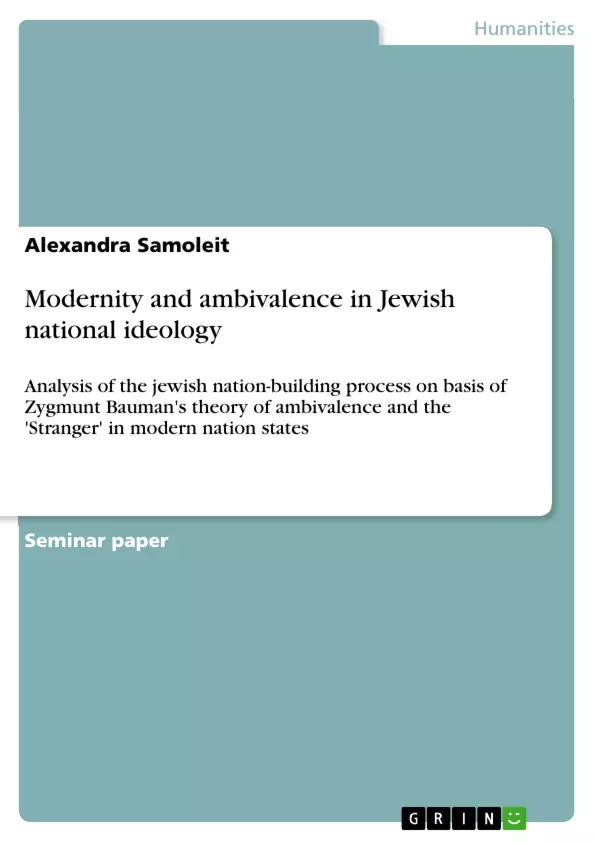Zygmunt Bauman's theory explains how modern nation states categorise and define their population, as well as "friends" and "enemies" based on ethnical, cultural and historical homogeneity. In this process ambivalent elements, especially minority groups. are eliminated from the nation. For Bauman this structural inheritent development is the main reason for the failed assimilatory aspirations of the German Jews in the late 19th and early 20th century. Zionism as reaction to denied national identity in the host countries shows in itself the same structural elements which caused the exclusion of the Jews from the German society. Jewish nationalists applied similar strategies and methods of stigmatisation and displacement during the Jewish nation-building process on the native population of Palestine and the oriental Jews to construct national order and identity.
Inhaltsverzeichnis (Table of Contents)
- Introduction
- Bauman’s Theory of Modernity and Ambivalence
- Zygmunt Bauman and his work
- Theoretical concepts
- Modernity
- Classification and Categorising
- Ambivalence
- The modern nation-state
- Power, social structure and the strife for order
- The role of minorities in the pre-modern order
- The stranger as inner-state ambivalence
- Modern state practice on the example of the Jewish community in Germany
- German Jews as the typical strangers
- Assimilation and Emancipation as counter-reactions to negative social identity
- From the failure of assimilation to Jewish national aspirations
- Some points of critique concerning Zygmunt Bauman’s theory
- Jewish nationalism as modern state theory
- Modern elements in Jewish nationalist thought
- Subject-identity
- Territory and landscape
- Common culture
- Common Jewish history and tradition
- Enemies and ambivalent groups
- Realities of Settlement
- Jewish settlement in Palestine since 1882 and the question of Jewish labour
- The first and the second Aliyah and the development of the ‘conquest of labour’- ideology
- Yemenite Jews as second class Jewish labour force
- Defence ideology and the Arab enemy
- The dehumanisation of the Arab as legitimisation for the defence-ideology
- Constructed historical continuity of anti-Jewish hostility
- Modern elements in Jewish nationalist thought
- The moral of the story(…)
- Conclusion
- The Search for a national identity continues
- Postmodernity as the ‘moral’ solution
Zielsetzung und Themenschwerpunkte (Objectives and Key Themes)
The main objective of this work is to analyze the Jewish nation-building process in Palestine through the lens of Zygmunt Bauman's theory of Ambivalence and the 'Stranger' in modern nation states. The author uses Bauman's framework to explore how Jewish national ideology emerged as a response to the challenges of modernity and to the ambivalent status of Jews in European societies.
- The role of ambivalence and the 'stranger' in shaping the experiences of minority groups, particularly Jews, within modern nation-states.
- The relationship between modern nation-building processes and the development of Jewish nationalism.
- The impact of Zionist ideology on the construction of a Jewish national identity and the definition of enemies and ambivalent groups.
- The consequences of the 'conquest of labour' and the exclusion of non-Jewish groups in Palestine during the early years of Jewish settlement.
- The ethical and moral implications of Jewish nationalism and its relationship to the Palestinian population.
Zusammenfassung der Kapitel (Chapter Summaries)
The first chapter introduces the work's central argument and outlines the author's approach to analyzing the Jewish nation-building process. The chapter also highlights the relevance of Bauman's theory in understanding the experiences of Jews in modern societies.
The second chapter delves into Bauman's theory of modernity and ambivalence. It explains key concepts such as classification, categorisation, and the 'stranger' as they relate to the structure and practices of modern nation-states. The chapter then applies Bauman's framework to the historical development of the Jewish community in Germany, examining the challenges of assimilation and the ambivalent status of Jews within the emerging German nation-state.
The third chapter explores Jewish nationalism as a modern state theory. It identifies key elements of Zionist ideology, including the construction of a Jewish national identity, the definition of territory, and the categorization of enemies and ambivalent groups. The chapter then examines the realities of Jewish settlement in Palestine between 1882 and 1914, focusing on the impact of Zionist ideology on the social, economic, and political landscape.
The fourth chapter delves into the moral implications of the Zionist project and the Jewish-Palestinian conflict. It explores how the 'moral' justification of Jewish nationalism shaped the relationship between Jews and Arabs, and how the process of nation-building contributed to the loss of moral agency and empathy.
Schlüsselwörter (Keywords)
This work focuses on key concepts such as Jewish nationalism, Zionism, modernity, ambivalence, the 'stranger,' nation-building, the Israeli-Palestinian conflict, and the role of minority groups within modern nation-states. The author analyzes these themes through the lens of Zygmunt Bauman's sociological theory, drawing upon historical examples and contemporary debates.
Frequently Asked Questions
What is Zygmunt Bauman's theory of the 'stranger'?
Bauman explains how modern nation-states categorize people as 'friends' or 'enemies', viewing ambivalent groups like minorities as 'strangers' that threaten national order.
Why did Jewish assimilation fail in Germany according to Bauman?
The failure was due to the structural inherent development of the modern state, which required homogeneity and excluded those who didn't fit the cultural or historical mold.
How did Zionism react to denied national identity?
Zionism adopted similar modern state-building strategies, focusing on territory, common culture, and the classification of 'enemies' to build its own national identity.
What was the 'conquest of labour' ideology?
It was a Jewish nationalist strategy in Palestine to secure economic dominance by preferring Jewish workers and excluding the native population and even oriental Jews.
How does postmodernity offer a 'moral' solution?
Postmodernity is seen as a way to accept ambivalence and plurality, moving away from the rigid categorizations of modern nation-states that lead to exclusion.
- Quote paper
- Alexandra Samoleit (Author), 2007, Modernity and ambivalence in Jewish national ideology, Munich, GRIN Verlag, https://www.grin.com/document/84179



